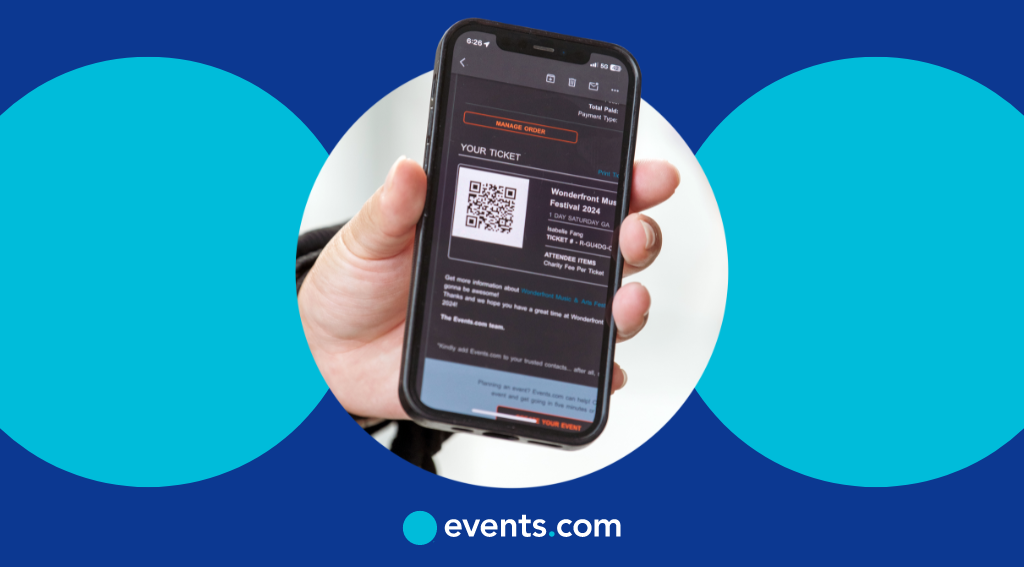Every event needs a ticket pricing strategy. After all, your ticket prices are a huge factor in whether your event will reach your revenue goals, or not. In this article, we’ll go over why it’s important to get your ticket prices right, the steps to do this, and more. Keep reading!
Why Is It Important To Get the Price for Your Tickets Right?
Getting the price right for your event tickets is important for many reasons. Firstly, you don’t want to price so high that you alienate people from buying, but you also don’t want to price your tickets so low that the event is no longer profitable. The price of your event can also affect the perceived value of the event itself. For example, pricing it too low can make the event seem less valuable to your audience. And finally, pricing your event at a number in which your event goers feel like they got what they paid for is crucial. You don’t want people leaving your event feeling like they overpaid and lose trust in the event in the process.Â
All these factors make your event ticket pricing strategy crucial to the success of your current event and future events. It’s not a decision to be made lightly!
7 Steps To Develop a Strategy for Pricing Event Tickets
It’s clearly important to get your event’s ticket prices right. But how do you do it? Keep reading to learn the seven steps to develop an event pricing strategy.
1. Determine Your Event’s Expenses
One of the biggest indicators that an event was successful is if it was profitable. The first step to creating a profitable event is to actually understand how much the event will cost. You can do this by carefully analyzing all the expenses associated with organizing and hosting the event. This may include things like venue fees, equipment fees, staffing costs, marketing expenses, catering costs, security, and more. If you have planned previous events like it, that data will be extremely helpful.
Once you understand the financial investment of your event, you can begin to estimate how much your tickets need to cost in order for your event to reach your revenue goals.
2. Define the Value of Your Event for Stakeholders
Defining the value of your event for stakeholders is another pivotal step in creating a pricing strategy for event tickets. The main stakeholders of your event may include attendees, sponsors, speakers, staff, and media. If certain stakeholders have a say in your ticket pricing, you’ll want them to understand what the value of your event is. And since your attendees are the ones who will be purchasing tickets for your event, it’s especially important for them to fully understand what they will be getting out of the event.
For example, if the event is a music festival, who will be there performing? Will there be food and drinks? How many days or hours is the festival? It’s important for your stakeholders to know the value of what they’re paying for. After all, it’s their hard-earned money, and no one wants to spend it on something if they don’t think they’ll have a great event experience.
3. Research Competitors’ Ticket Prices
It would be difficult to determine a price for your event if you had nothing to compare it to, so researching competitors’ ticket prices is another essential step in developing a strategy for pricing event tickets. If you’re doing value based pricing, which is when pricing is based off of how much a customer perceives it to be worth, it would be a bad look if a similar event with similar offerings is charging significantly less or significantly more than your own event. You’ll want to have competitive prices.
Using the music festival example, if you are organizing your own music festival, you can look into what other festivals are charging and what they are offering. Then, use that information to help inform your own pricing strategy.
4. Forecast the Number of Potential Attendees for Your Event
Another thing to consider when it comes to coming up with a pricing strategy is how many people you expect to attend your event. The amount of people coming to your event informs other aspects of your event expenses like your venue, staffing requirements, and other logistics. So before you start selling tickets, make sure you have as good an estimation of your potential attendees as possible.
5. Calculate Your Tickets’ Minimum and Maximum Price
With your knowledge of the number of potential attendees and the expenses related to your event, you’ll be able to calculate the minimum cost per ticket needed for your event to break even and to reach your revenue goals. Though the maximum price you can charge is also a good number to know, as it’s important to strike the right balance between the minimum and maximum prices, it can help make sure that ticket pricing is both competitive and reflective of your event’s worth. To determine the maximum price, think about the perceived event value, competitor pricing, and your target market.
If you’re offering tiered pricing model at your event, understanding these numbers can help you determine how much you will charge for more or less expensive tickets and what you will offer for each.
6. Define Stages To Introduce Discounts and Price Increases
Strategically timing discounts and price increases is often a great way to maximize ticket sales and your profits. So, make sure to define these stages before your tickets go on sale. For example, many events offer discounts during early bird or pre-sale stages, so your ticket buyers are incentivized to make their decision about your event early. Another strategy events may use is same-day price increases. This can help you motivate potential customers to not wait until the last minute to buy their tickets.
7. Outline the Channels Through Which You’ll Sell Your Tickets
Another thing you’ll need to do when developing a ticket pricing strategy is outline the channels through which you’ll sell your tickets. For example, you might sell tickets on online platforms, directly on your website, through partners, or even directly at the door of your event. Each channel may have different costs, such as service fees or commissions, which can also impact pricing decisions. Understanding the preferences and habits of your target audience can help you determine which channels are most effective for ticket sales, how you can reach a wider audience, and how you can make ticket purchases as simple as possible.
What Are Some Lucrative Ways To Boost Event Ticket Sales?
Coming up with an effective ticket pricing strategy is an important part of organizing any event. However, not every event will sell out quickly, and there is often a need to take some steps to boost ticket sales and make sure you’re reaching your goals. Here are some lucrative ways to do this:
- Early bird discounts: As discussed earlier, offering discounted prices for making a decision about your event earlier than others can incentivize early ticket purchases and create urgency among potential attendees.
- Promotional campaigns: Investing in event marketing can lead to big returns when it comes to ticket sales. You can promote your event in a number of ways, including social media ads, organic social media, email newsletters, and influencer partnerships, and more to increase visibility and attract a larger audience.
- Ticket bundles: Most of the time, people prefer to go to events with a friend or a group. So, offering ticket bundling savings can help drive sales and encourage people to invite others so they save more. Besides ticket bundling, you can also offer referral incentives so you have more guests inviting others to join the event.
- Limited availability: Letting people know that there are limited tickets available makes them understand there’s a possibility of missing out on the opportunity to go to your event. This can help boost conversion rates as it motivates more people to take the plunge and buy a ticket.
- Promo codes: Everyone loves a good discount. Offering discounts can encourage more ticket sales without changing the official price of your tickets to make sure you don’t miss out on maximizing your profits.
Find Everything You Need To Make Your Event a Success
Making your event a success can be a challenge, especially when there are so many factors that ultimately end up influencing the outcome. However, with Events.com, planning and executing a successful event has never been easier. With the Events.com Sell platform, you can:
- Sell tickets through an easy single-page check-out
- Create multiple ticket types
- Create discounts
- Get paid directly through your Stripe account
- Add multiple team members
- Use our refer-a-friend feature
- Manage ticket sales
- Access analytics
- And more!
Creating a great ticket pricing strategy is only useful if you have a great place to actually sell the tickets. So, set up your event ticket sales in minutes and start focusing on other parts of your event! Schedule a demo today.




